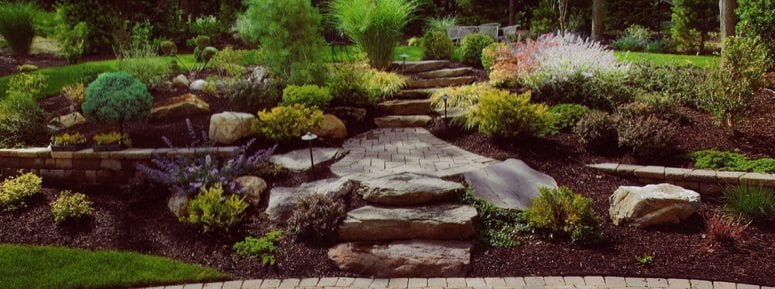Organic lawn care has become a widely trending topic over the last decade largely because of the harmful effects that chemicals and pesticides are having on our environment and health.
In 2013 we became exclusive organic lawn and plant care providers by joining BeeSafe Land Care because we acknowledged the severity of studies that have linked pesticides to birth and reproductive defects, liver and kidney damage and hormonal imbalances. Since that time we have worked diligently to utilize natural and safe products on all of the landscape designs that we create and install. The benefits of organic lawn care are many and implementing a routine schedule of the tips below will improve the look and feel of your landscape.
 Benefits of Organic Lawn Care
Benefits of Organic Lawn Care
Organic lawns are deep green and lush; they will also stay this way during times of stress.
Organic lawns require less watering.
Organic lawns don’t have to be mowed as often.
Organic lawns show fewer imperfections throughout.
Organic lawns are good for the environment because they release more oxygen to cool the environment, purify water supplies, and absorb carbon dioxide.
Organic lawns are safe for your family and pets with no downtime between treatments.
How to Get Started
- Immediately stop using any chemical or synthetic fertilizers and pesticides. Using these harsh chemicals on your lawn can ultimately make the soil sterile and unable to grow much of anything. Chemicals on your lawn will also kill worms who aid in making sure landscape erosion doesn’t happen on your property.
- Test your soil to see what deficiencies your soil may have. Adding a catch-all fertilizer to your soil can do more harm than good. Find out exactly what your soil needs to grow healthy plants and give it those specific nutrients. Inundating your soil with things it doesn’t need will only harm the environment and your chances of having a stunning lawn.
- Aerate your grass and garden’s soil to allow nutrients and water to get deeper below the surface. Aerating your lawn every few years will ensure that the dirt on your landscape does not become too compacted to sustain plant life.
- Spread organic compost materials by utilizing a spreader for large areas or a rake for smaller and simpler areas. This will feed your lawn and keep it healthy. Lawns that have an increase of even just 5% organic material need four times less water. Adding corn meal to you spread will also prevent weeds and add nitrogen rich nutrients to your landscape.
- Choose the right grass for your environment and spread seed in the spring and fall to crowd out weeds. By making your grass fuller and thicker, weeds will have less space to germinate and prosper.
- Ensure that weeds aren’t able to spread and keep your lawn thicker by keeping your mower blade sharp. Cutting your grass with the mower blade at a height of 3 ½ inches will also keep weeds at bay and allow you to water your grass less.
- Mulch grass clippings instead of removing them after cutting your grass. Leaving the mulched clippings behind will eliminate crab grass and feed your lawn at the same time.
- Your lawn needs about one inch of water a week to stay healthy. Deep but infrequent irrigation will force your grass’ root to dig deeper into the soil making it stronger, more resilient and resistant to unwanted weeds.
- Watering your lawn in the morning will decrease the likelihood of your landscape contracting a fungus or disease. A.M. watering will also allow the sun to dry up any excess water that may cause damaging effects to your beautiful organic lawn.

The tips listed above are a start but organic lawn care takes time and patience to find the right balance of nutrients, soil and water. To find out more about organic lawn care or our BeeSafe program, contact us today!

